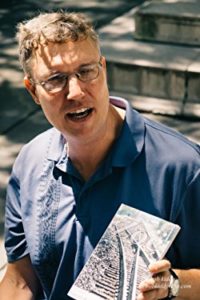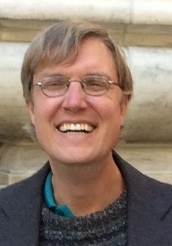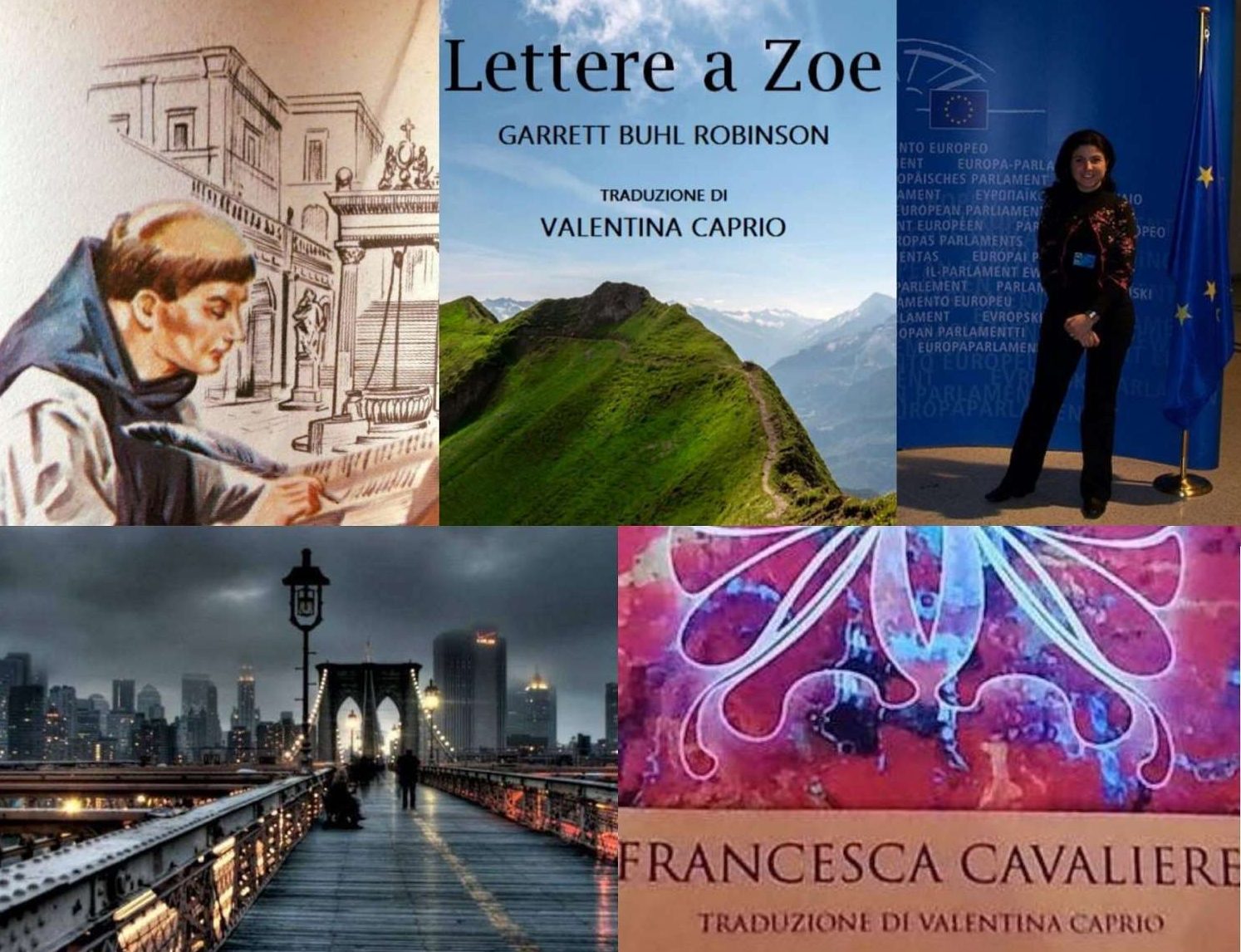Seated behind a small table full of booklets on a small chair which disappears beneath his imposing figure, in front of the Fifth Avenue Public Library in New York City, a big, blond boy greets anyone who meets his gaze and, if they pass close enough, he smiling asks them if they want to listen a poem.
I met Garrett like that and I bought this book.
A giant with a child’s face, a self-made man who sells his works directly to people. This, he says, is one of the most beautiful experiences of his life and if we find him still there, every day, on that chair, then we must believe him. Despite the -20 degrees Celsius in winter or the humid +40 degrees in summer, he stays there for entire days, always smiling, always ready to give off positivity and hope, strength of will and trust.
His ambition as an artist is to drag the audience into a work so that everyone feels something inside and shares the experience. An impossible mission for a city that runs frantically and never sleeps.
Yet someone stops.
The bystanders who listen to him get hypnotized every time, not to just read a few passages with him, not to just watch and listen. They live with him a fragment of his story, they cling for a moment to his Being as a man, to his world that is strangely theirs too. And with him they seem to get on a stage, and take part in a show that is then the life of every day.

This collection of letters is based on real experiences in 1992, but it is not a memoir nor a love story.
There is a wider range of thematic variations, there are several possibilities that emerge from the decision to suddenly leave one night, depending on whether the trip is intended as a practice of freedom or as a “school of discomfort”, or as a social experiment, or introspective knowledge and personal growth, or finally as a path of construction / deconstruction of individual identity that leads back to the mother-nature or the love of a life, Zoe.
It remains, therefore, that the theme of love, especially if specifically understood in the sense of “love story”, occupies only a secondary position in the whole.
The path of the protagonist is much deeper than it appears. The transit in the essence is transit in the unknown, in the Nothing, and together is the rebirth of Being.
Weldon suffers from the “discomfort of civilization”. The sudden desire to give up the conventions and “unplug”, being alone, learning to truly know himself and at the same time the impulse to tell her, Zoe, the childhood friend for years the girlfriend of a dear friend of the protagonist, are all – a time on the page – language.
And that’s where all the chickens have come home to roost.
How to escape from the limitation of words in respect to the immensity that a man carries inside? How to do justice to the smile of her that lifted, or to the feeling of freedom once the train’s ladder is grasped, to the tenderness in front of his mother kneeling down to work, or to the fear of death in the blind darkness of a cave?
The I-narrator self-compels itself to be clear yet quick in the description of his feeling, clear and simple despite the confusion of his head, but never of his heart.
At times he is verbose in order to be precise in the message, but always poetically delicate, prudent, sensitive.
Like Dante had Beatrice, Weldon has Zoe, who drives him in his dreams and takes him to the Garden of Eden, and always in a dream, the loving experience of a virgin boy reminds us that love is not possession, love doesn’t want “to have”, LOVE just wants “to love”.
And in the book everything inspires love, whether it is a crow, a mountain, or a straight highway: everything is a pretext to look with other eyes, everything is “feeling/to feel”: when he puts off his shoes to touch the ground barefoot, when the heavy bag of useless things of the past pulls his shirt almost as if it wanted to keep him from jumping on that train, when in the dark cavern he searches with his fingertips the contours of her face and then the thunders, the dripping, the feeling on his own the space around, and groping, to exit life. And after the efforts and the fear, finally, blinded by the light, whether it is a flash out of the cave, or the sunrise on top of a mountain, or the sound of her, everything is feeling, with new senses.

The real journey on the road and the inner journey mingle and become literature, invested by the time of the written formulation.
The reader, that is, travels in a temporal segment (February-October 1992) which is the material time of the writing of the letters, and at the same time the reader observes that scrolling pen on those papers. Behind that confused lexicon, chaotic as the junk in the bag of the protagonist, slowly opens the abyss of a casual evolution, without a pre-arranged goal, made of tracks, roads, bridges and cars, but above all made of nature, the mother of every man to which the author abandons himself, from which he lets himself be lulled, tempted and inspired.
Another essential aspect is the distance, both spatial and temporal. It is already evident from the dates that become more and more distant during the progress of the story. Until, instead, we notice a rather rapid succession in the last two letters. We understand that we are close to a change, an understanding, a final decision. The Past lightens in the Present and suddenly smells of Future.
The focus on different elements and their interaction is the basis for this work:
- Among the inevitable conflicts of the main character that emerge in the story there is one that torments and unites adolescents from every Country. Weldon was determined to do everything by himself, not to wait for anyone and not to force others to wait for him, and he hoped to overcome the frustration of trying to coordinate his life with that of others who may have different interests. Yet he remained dependent on others and on the society he tried to escape from; he wanted a life of “purity”, but he understood that he continued to use things produced by man (he needed a knife, a sleeping bag, a torch, or simply looking at a picture to feel alive). Is it therefore impossible to live alone?
- There are various occasions that lead him to reconsider his strong and impulsive critical sense of the boy towards more mature reflections (e.g., he does not protest the bridge toll he is forced to pay despite his being on foot and the lack of a pedestrian lane, but he appreciates the fact that the bridge exists and allows it to cross without having to swim). The experience on his skin and the daily difficulties, large or small as they can be, allow him to reflect more deeply and more rationally on the true nature of the situations. And consequently the intolerance and the complaints become gratitude and appreciation. For everything and everyone.
- A simple guy like Weldon also points out that those who run away are not afraid, they just want to go elsewhere. So much better if at a young age, in full formation of the personality, it is necessary to relate and compare to the rest of the men, and not to get comfort behind our gates, in our zone. And so, in turn, he learns to let go, because the more he let go, the more he felt a great sense of peace.
I found particularly charming the power of the locomotive that drags him away from the reluctance towards the unknown. It appears lighter in contrast to its prefixed purposes and interests that, instead, met and still meets an unexplainable resistance.
The train tracks as a symbol of research, moving away from a known and set life to discover something new, which brings it back to Zoe as all he needs. The illusion or the hope that the tracks will meet sooner or later, who knows after how much walking. He leaves us like this, Weldon, with the freedom to choose how it will end, if it must end.
Research, on the other hand, is continuous. This, in my opinion, is his most important message.
“Freedom” for Weldon is not only the open space in contact with nature, but the courage of the decision to leave, the ability to be alone and to walk on your own legs. It does not matter the destination, but the journey itself. The ultimate goal is not a location, but rather a way of seeing things.
The moment he grabbed the train’s ladder after his jump, he felt he was feeling his wings and it seemed to him that the sand scraped his skin to speed up his transformation: a switch from adolescence to adulthood with a jump, leaving the social conventions and the imposed life (from the family, from the school, from the Church, etc.) to find out by himself who he really is and what he needs to stay well, confronting with collective expectations and his own interests.
Just moving, even without a prefixed goal, is, therefore, the very figure of an existence worth living: the relentless pursuit, the courage to risk and to lose oneself, the continuous tension to an authenticity that only in the deep of the soul is reachable.
And Garrett, the itinerant poet sitting in front of the New York Public Library, knows it.
Valentina Caprio

